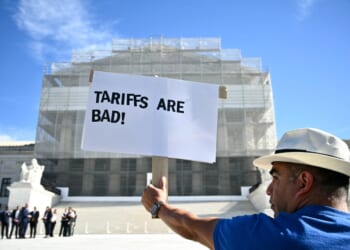
Cooke is running for the second time against Van Orden, a Trump-stroking, self-abasing sycophant who was mixed up in the “Stop the Steal!” nonsense, spends way too much time on social media, and once tried to pass through airport security with a loaded 9mm automatic. Van Orden is a comical figure, one of those former Navy SEALS who likes to remind people he was a SEAL every 11 minutes and who once played a SEAL character in a low-budget movie, “The story is fictional, but the weapons and tactics are real.” He is a manly man’s man, who, in case you may have forgotten, was once a SEAL, and who co-wrote a book (“book”) titled A Book of Man: A Navy SEAL’s Guide to the Lost Art of Manhood.
Van Orden is a public servant who once had a public meltdown at a public library, publicly berating a teenage girl working there (he apparently has a thing about flipping out at teenagers) in a rage-filled tantrum over a book called A Day in the Life of Marlon Bundo, a work of satirical fiction that portrays the titular character, Mike Pence’s real-life pet rabbit, as gay. (I am sure that Mike Pence is as straight as the flight path of a neutrino, but if you told me with no context that you had an adult male friend with a pet rabbit named “Marlon Bundo,” I’d assume a very serious interest in musical theater at the very least.) Also, you may not know this, but Van Orden is a former SEAL, albeit a SEAL who must have skipped the day in weapons-handling class when they tell you not to stow a loaded sidearm in your carry-on and try to get past the TSA clowns with it.
Van Orden, a former SEAL, is big on tariffs—he’s big on knuckling under to whatever low-rent buffoonery Trump demands of him, at whatever cost to Wisconsin farmers—and, as such, free-traders would have no reason to lament his ejection from the national legislature.
But the most important question in politics is—say it with me!—“Compared to what?”
Cooke, Van Orden’s Democratic challenger, recently put out a statement calling on the Trump administration to “exempt soybeans from tariffs,” noting that Chinese purchases of U.S. soybeans have collapsed from $12.4 million in 2024—and I’ll just go ahead and note here that her press guy surely meant billion, not million—to approximately squat so far this year. True, but not because of Trump administration tariffs on Chinese soybean imports (which are a real thing, incidentally—as with oil, the United States is both an exporter and importer of soybeans) but because of Chinese sanctions on soybeans imported from the United States. This isn’t a tit-for-tat soybean issue: Beijing has targeted soybeans as part of its retaliation against U.S. tariffs on Chinese exports more broadly and has been doing so off and on since the first Trump administration.
We’ve been here before. In the course of the first Trump-launched U.S.-China trade war, U.S. soybean producers once again took it in the shorts while their Brazilian competitors picked up the slack and profited handsomely. There are Chinese tariffs on U.S. soybeans, but these are almost beside the point: One of the things about running a ruthless police state is that the powers that be in Beijing can simply decree that nobody is going to order U.S. soybeans for the time being, and that’s that.
Traditionally, the Chinese had imported U.S. soybeans after the Northern Hemisphere harvest and then Brazilian soybeans after the Southern Hemisphere harvest. When Trump and his idiot trade team nuked that market the last time around, the shot-callers in China—where they like to build stuff!—ordered the construction of new storage facilities that would leave Chinese consumers (meat producers, mainly) less dependent on U.S. soybeans. U.S. soybean producers had worked for decades to build relationships that allowed them to thrive in the Chinese market, and they suffered a permanent loss of their hard-won advantages, practically overnight, because Donald Trump is a fool and Peter Navarro is a crackpot.
It isn’t just the Brazilians profiting from the evisceration of U.S. soybean exports. Producers in Argentina are getting a slice, too, for similar crop-schedule reasons, and U.S. soybean farmers are particularly galled by the fact that Trump recently announced a bailout of the Argentine government amounting to tens of billions of dollars. Is that in the service of some vital U.S. interest in Argentina? Of course not: It is simply a reflection of the fact that Argentina’s populist president, Javier Milei, has gone out of his way to suck up to Trump, and Trump is a fool for flattery. (A fool in general, true, but a fool especially vulnerable to flattery.) From the New York Times:
The American Soybean Association, which has been lobbying for economic support for farmers, said that the “frustration is overwhelming.” The group pointed out that Argentina just lowered its export taxes so that it could sell even more soybeans to China, further undercutting the U.S. farmers who face high Chinese tariffs.
“U.S. soybean prices are falling; harvest is underway; and farmers read headlines not about securing a trade agreement with China, but that the U.S. government is extending $20 billion in economic support to Argentina,” said Caleb Ragland, the president of the American Soybean Association.
To farmers like Mr. Ragland, a bailout for Argentina, which is undercutting American soybean exports, feels unfair.
Un-dumbing the U.S.-China trade relationship so that soybean farmers can go back to serving their biggest export market may not be possible. But if it is possible, it is not a matter of the Trump administration ending tariffs on Chinese soybeans or somehow convincing the Chinese to end tariffs on U.S. soybeans while the U.S. government continues to conduct a broader trade war. The Chinese didn’t choose soybeans at random—they know how to make a trade war hurt. If you want U.S. exporters to have access to the Chinese market, you cannot get there by mucking around with soybean policy in isolation—you have to clarify and stabilize the overall trade relationship, which will necessarily include reducing U.S. barriers (tariffs, etc.) to Chinese exports. If you want something from Beijing, you have to give Beijing something Beijing wants, too: That’s how negotiation works. Our president, however much he likes to pretend to be a world-class negotiator, is utterly incompetent when it comes to that sort of thing.
But Cooke is not really making a case for a broader tariff-reduction or trade-liberalization policy, vis-à-vis China or in general. When I put the question to her press guy, the answer was … unsatisfying. “Rebecca Cooke wants to protect Wisconsin soybean farmers from further financial pain by taking soybeans out of the trade war fight,” he told me. “The onus is on Trump and Republicans to deliver relief.” That’s a piss-poor answer for more than one reason: On the specific policy question, there isn’t any way to simply carve soybeans out of the dispute: China’s position as a buyer of U.S. soybean exports is not quite monopsony, but it is big enough to inflict a lot of pain on a politically sensitive U.S. industry that doesn’t have a very good next-best scenario. As a more general matter, it makes me want to grow my hair out just enough to pull some out when somebody who seeks to wield the awesome powers of Article I of the United States Constitution acts like she’s signing up to be some helpless waif whose only job is to whine about the president and his party and demand that somebody do something.
Why in Hell does Rebecca Cooke want to be in Congress if she thinks that the only people who can do something about U.S. trade policy are Donald Trump and his supine yes-men in Congress? It is true that Democrats are in the minority. It is also true that they wish to be in the majority, presumably for the sake of trying to do something about this issue and others. Why not be more frank and energetic about what they propose to do other than moan about Republican incompetence—which, at this point, is like moaning about mosquitoes at a Louisiana lakehouse in August: Nobody likes it, but it seems to be the natural order of things.
Donald Trump may be the proximate cause of our trade chaos, but the problem is, at heart, one created by Congress, which has ceded too much power to the executive branch, among other things unconstitutionally delegating its tax powers to the president by permitting him to create taxes and set tax rates on a freelance basis as long as they are taxes on imports. Not only is this a problem that can be fixed by Congress, it is one that can only be fixed by Congress.
Democrats are right when they argue that there is not going to be any end to these trade misadventures while Mike Johnson, that wondrously gutless Trump enabler, is speaker of the House. Johnson has gone as far as to use procedural shenanigans in the Rules Committee to preemptively rule any attempted House votes that would threaten Trump’s patently unconstitutional tariff project “out of order”—as things stand, no such votes can be conducted through March of next year, meaning that even if Congress did muster the gumption to do something about this aspect of the imperial presidency, nothing will happen because the speaker of the House answers to the president rather than the House, having chosen to subordinate himself to the executive branch and, thus, to forsake his actual constitutional duties.
When I talk to Democrats, they try to convince me that they are where I am on trade. But Democrats are not running on a free-trade platform. They are running on a platform of pretending that economic tradeoffs aren’t real or that they can be magicked away with sufficient cleverness in policymaking and rhetoric.
Democrats—even farm-state Democrats—have a hard time making a forthright case for free (or simply more liberal) trade on either principled or pragmatic grounds, because many of their most important constituents are just as nationalistic as the econoxenophobes in the Trump movement while a good share of the rest of them hate capitalism, full stop, and are not going to be much moved by free-trade arguments. Rank-and-file Democrats are much more intensely nationalistic than you might imagine: I once attended a Bernie Sanders campaign event at which foreign-made cars were banned from the parking lot. (In Michigan’s automotive heartland? No, surrounded by the cornfields of Iowa.) Tariffs and trade protectionism are remarkably popular across the partisan divide—that’s one of the ways you know they are stupid.
And that is one reason why Cooke, who can obviously see the benefits of opening markets for Wisconsin farmers, proposes to create new trade barriers, for example in the form of expanded agricultural subsidies for local farming interests, acting in the grand tradition of proposing to bribe the voters with their own money. Farmers may understand the value of integrated global markets, but no Democrat wants to trot on down to the local union hall and explain that we’re reducing or removing tariffs on Chinese-made electric vehicles and household appliances in order to restore U.S. agribusiness’s access to its most important export market.
Not to belabor the Hayekian point, but what we have here is an excellent example of highly efficient and capable producers—the astonishingly sophisticated American farmer—being hamstrung by populist policy in order to protect the interests of less efficient and less productive firms, including middling American manufacturers. American manufacturers at large are far from a middling group, and Boeing doesn’t need to hide behind a tariff wall. Neither does Dell. Neither does Micron Technologies, which has been more inconvenienced by tariffs than protected by them, something that is true for many U.S. firms with global reach, global operations, global supply chains, and—in case anybody is paying attention—global policy vulnerabilities of the sort that you might want to take into account before launching an idiotic trade war. Like American wine producers, many U.S. manufacturers end up being kneecapped by tariffs that are supposed to hobble their competitors, because those tariffs are enacted by a bunch of lawyers in Washington who have no idea how the industries they purport to manage actually work.
There’s a lot to the trade issue. It is complicated. And I understand why Cooke’s press spokesman complained to me about his candidate “being held to the standard of ‘solve the U.S.-China mess’ when the release we put out talks about protecting soybean farmers.” (These poor press guys apparently never stop to think that the half-assed stuff they too often put out will land, from time to time, in the inbox of somebody who knows about the issue and actually gives a damn about it.) My response to that is: Read Article I of the Constitution and then tell me why I shouldn’t expect someone who wants to sit in the House of Representatives to do the goddamned job, including the very hard and thankless and politically difficult work of solving the U.S.-China trade mess. Because the House is where that work gets done if it gets done—it is where the mess gets cleaned up, if it ever is to be cleaned up.
The Democrats are right in the first part of their analysis: The tariffs are hurting both U.S. producers and consumers, and the madness is not going to end while Mike Johnson—or any similarly servile water-carrier for Trump—is in the speaker’s chair. But that’s just the beginning of the conversation.
Trade-offs are a real thing, and Democrats are in a real bind between constituencies that have different interests, different priorities, and different preferences where trade is concerned. Unfortunately, Democrats in power have dealt with that mainly by continuing Trump’s trade policies—which is more or less what the Biden administration did, keeping most of the tariffs from the first Trump administration in place, indulging the same kind of illiterate economic nationalism, as well as maintaining various forms of non-tariff protectionism. Democrats hardly have clean hands on this: I am old enough to remember 2012, when Democrats ran ads denouncing Mitt Romney as an “economic traitor”—and is there a dumber, Trumpier formulation than that?—for his liberal views on trade. Barack Obama spent a good deal of time talking about a “new nationalism”—Obama’s own words, referencing Teddy Roosevelt—lampooning those with pro-trade views as people who believe that “the market will take care of everything.”
Democrats are going to have to do better than that kind of cheap horsepucky and better than Cooke’s special-pleading for strictly parochial interests if they want to move the ball on the trade issue—and maybe along the way pick up a few votes from people who care about that issue, who tend to be the affluent and educated cosmopolitan professionals who are today a natural Democratic constituency.
But, for goodness’s sake, don’t go around talking as though a House seat were simply a perch from which to pronounce preferences about policy outcomes. John Quincy Adams had a disappointing presidency that ended with his humiliating defeat by arch-rival Andrew Jackson. Adams did not spend the rest of his life monetizing his celebrity and connections—he returned to the House of Representatives and spent the rest of his life there, doing work that he believed to be important. He dealt with a lot of big issues, including slavery—and he never protested that the onus was on Andrew Jackson to figure it out.
And Furthermore …
There is a great scene in The Paper, maybe the greatest movie ever made about newspapers, in which a New York City parking commissioner (played by Jason Alexander) who has been the target of a crusade by a tabloid columnist (played by a perfectly cracked Randy Quaid) has a tearful breakdown and demands (at gunpoint!) to know: “Why did you have to pick on me?” The exasperated columnist answers: “You work for the city. It was your turn.” I don’t think Rebecca Cooke is any worse (or, alas, much better) than any other Democratic office-seeker on this issue. Why am I picking on her? Because her press release landed in my inbox. Because it is her turn.
Economics for English Majors
One of the things that cost John Quincy Adams the presidency was the Tariff of 1828, a.k.a. the “Tariff of Abominations.” Farmers hated it because it raised prices for many ordinary goods (farmers were, in the main, a relatively low-income group concentrated in the South) and did nothing for their overseas markets, while northern manufacturers did not much like it, either, because it raised the cost of many of their raw materials and other inputs. Everybody expected the bill to die ignominiously, but some New England manufacturers and their representatives in Congress reluctantly supported the bill because they wanted to entrench protectionism in principle. According to legend, the Tariff of Abominations was an intentionally bad bill, written to discomfit Adams’s congressional allies, and many observers were surprised when so many New Englanders voted for it and Adams signed it. Everybody knew it was a bad deal, but the president and his allies supported it for messaging purposes—they passed a dumb law to prove to its victims that they were on their side. Plus ça change, plus c’est la même chose. I am a fan of both Presidents Adams, but this was not John Quincy’s finest hour.
Words About Words
“Do we believe all women, or do we not?” The New York Times quotes a reader discussing Amy Griffin’s almost certainly fictitious “memoir” recounting supposed sexual abuse by a middle-school teacher, the memory of which she supposedly recovered while taking MDMA, an illegal hallucinogenic drug.
The specific question there—“Do we believe all women?”—is reasonably easy to answer: No, of course not. There is some debate about how prevalent false reporting is when it comes to claims of sexual assault, sexual abuse, and sexual harassment, but no serious observer believes that the rate of false reporting is 0.00 percent.
I know a little something about this owing to the fact that I once was asked to review a memoir written by Lena Dunham, the gifted actress and screenwriter, in which she recounted being raped at Oberlin by a College Republican named Barry, an account that was, like a good deal else in Dunham’s supposed memoir, pretty obviously made-up. But there was a prominent College Republican named Barry at Oberlin during Dunham’s time there. I interviewed him about the book (something no one else had bothered to do) and printed his version of the story—not only that he had not raped Lena Dunham but that he had never had any kind of encounter with her and did not know her at school. Dunham did about what you would expect her to do, claiming that she hadn’t meant to indicate that Barry but a different man (Barry is an uncommon name, not among the top 1,000 men’s names in the United States, and Republicans are not exactly planted thick on the ground at Oberlin) while her publisher, Random House, promised to revise the book and paid a small settlement (legal fees) to the real-life Barry who had been smeared.
Believe all women? Not Lena Dunham, surely.
Slogans have a way of overpowering critical thought. Jonah Goldberg wrote about this at considerable length in The Tyranny of Clichés. As anybody who remembers the “Satanic panic” hoaxes of the 1980s and 1990s surely knows, “recovered memories” are by and large baloney, hokum, and pseudoscience. And as those of us who made a lot of bad decisions earlier in life can tell you, MDMA does not have the kind of effects described by Griffin, whose family just happens to be invested in an MDMA-oriented business. (The Times’ reporting on this is excellent, good work by Katherine Rosman and Elizabeth Egan.) There is no evidence at all that the events recounted by Griffin happened—to her, anyway: Another classmate with whom she was acquainted says she suffered similar sexual assaults, with details nearly identical to the ones Griffin describes, perpetrated by a different teacher.
Like Dunham, Griffin is a child of privilege (her socially prominent family grew wealthy operating Toot’n Totum convenience stores in Amarillo, Texas, where I was born and spent part of my childhood), and it is not uncommon for such people to invent struggles and trauma for themselves, providing their pampered lives with a kind of moral glow. At a social event a couple of years ago, I heard a young woman from a wealthy family being lionized for overcoming all of the many obstacles in her life and for having the guts to “leave home” at the age of 15—“leaving home” in this case being another way of saying that she attended a fancy boarding school before going on to enjoy her trust fund. One can only imagine what it took to overcome that.
Slogans are powerful because words are powerful. We have to be on guard against allowing ourselves to be overpowered by them. We owe it to justice—and to victims of sexual abuse—to use our brains in such a way as to enable us to do keep more than one thing in our heads at a time: that women coming forward with claims of abuse deserve a sympathetic hearing and a thorough investigation of their complaints, and that at least some of them are not telling the truth. People make false claims of sexual abuse fairly commonly—ask a retired family-law judge if you doubt that. People who are paid something on the order of $1 million to write a memoir are paid that amount because the publisher expects that the book will sell well enough to justify the advance—and the financial incentives there sometimes, unfortunately, produce fiction masquerading as nonfiction. We have developed something very close to a language taboo that prevents us from saying to non-credible sources—say, Christine Blasey Ford—something as simple as, “I do not believe your story.”
Believe all women? No, of course not. Believe all men? No. Believe all politicians? Priests? Professors? No, no, no. Listen? Yes. Think? Yes. Take serious things seriously? Yes.
Elsewhere
You can buy my most recent book, Big White Ghetto, here.
You can buy my other books here.
You can check out “How the World Works,” a series of interviews on work I’m doing for the Competitive Enterprise Institute, here.
In Closing
In general, I prefer that people feel good about themselves. But there are some people who should be feeling kind of stupid right now: people who supported Donald Trump because they thought he would end the weaponization of the federal government in general and of the Justice Department in particular; soybean farmers who supported him because they believed he is a smart businessman and because they were spooked by conspiracy theories and nonsense about “cultural Marxism”; people who thought he would end the Russian war against Ukraine quickly and on reasonable terms; etc. The problem with democracy is not the demagogue—it is the demos.

















